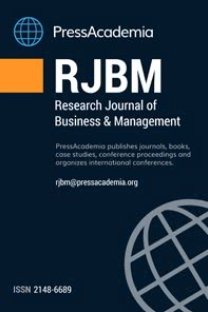DETERMINATION OF THE RELATIONSHIP BETWEEN MATHEMATICS LITERACY, MATHEMATICS CONTENT KNOWLEDGE AND SCIENCE LITERACY ACCORDING TO PISA 2012
Purpose- In the PISA (Program for International Student Assessment), science and mathematics literacy are emphasized. PISA data are being benefited in directing education policies. In this study, it was aimed to determine the relationship between Mathematics Literacy, Mathematics Content Knowledge and Science Literacy of 15 years old students in Turkey by using PISA 2012 data. Moreover, it was aimed to reveal whether there is any relationship between the time spent on science and mathematics outside the school and students’ Science Literacy. Methodology- This study is a descriptive research. As a research instrument, the researchers used the results of cognitive tests utilised by PISA in 2012 to assess students’ science and mathematics literacy skills. The data were obtained from the official website of PISA. In this study, parametric tests were used in evaluating the quantitative data. An ANOVA test and the correlation were used. Findings- The results show that there is a positive and meaningful relationship between Mathematic Literacy, Mathematic Content Knowledge and Science Literacy. Furthermore, it was found that there is a positive and meaningful relationship between the time spent on science and mathematics outside the school and students’ Science Literacy. Conclusion- According to the results of this study, it might be said that Mathematics literacy, Mathematics Content Knowledge and the time devoted by students to Mathematics and Science outside of the school increase, the Science Literacy increases. In addition, it was revealed that the students who have a good understanding of Mathematics are more positive in Science Literacy. Therefore, the mathematical concepts related to the science should be included in the science curriculum after being taught in the mathematics course, this will contribute to science literacy of the students
___
- Başkan Takaoğlu, Z. (2015). Matematiksel Modelleme Kullanılan Fizik Derslerinin Öğretmen Adaylarının İlgi, Günlük Hayat ve Diğer Derslerle İlişkilendirmelerine Etkisi, YYÜ Eğitim Fakültesi Dergisi,Cilt:XII, Sayı:I, 223-263 http://efdergi.yyu.edu.tr.
- Büyükalan Filiz, S. & Kaya, V. H. (2013). Examine the Relationship Between the Curriculum of Science and Technology Course in Elementary Education and the Curriculum of Undergraduate and Graduate Programs of Science Teacher Education in Terms of Philosophy, Goal and Content., Journal of Turkish Educational Science, 11 (2), 185-208.
- Davison, D., Miller, K, W. & Metheny, D. L. (1995). What Does Integration of Science and Mathematics Really Mean? School Science and Mathematics, Volume 95(5), 226-230.
- Deboer, G. E. (2000). Scientific Literacy: Another Look at Its Historical and Contemporary Meanings and Its Relationship to Science Education Reform, Journal of Research in Science Teaching, 37(6), 582–601.
- Güneyli, A., Özder, H., Konedralı, G. ve Arsan, N. (2010). İlköğretim Öğrencilerinin Türkçe İle Diğer Ders Başarıları Arasındaki İlişki, Mediterranean Journal of Educational Research, 3(7), 60-72.
- Kanatlı, F. & Çekici, Y. E. (2013). Türkçe Öğretiminde Disiplinler Arası Olanaklar, Mersin Üniversitesi Eğitim Fakültesi Dergisi, Cilt 9, Sayı 2, ss.223-234.
- Kaya, V. H. & Dogan, A., (2016). According to PISA 2012, The Determination and Comparison of the Student Factors Affecting the Science Literacy of the Students in Turkey, International Conference on Quality in Higher Education Proceeding Book, Sakarya, Turkey.
- Kaya, V. H. & Kazancı, E. (2009), Ekolojik Okuryazarlık, Bilim ve Teknik Dergisi- Yıldız Takımı Eki, Sayı 11.
- Kaya, V. H., Godek Altuk, Y., & Bahceci, D, (2012), Elementary School Students’ Views and Images Concerning Science Teachers, Procedia - Social and Behavioral Sciences, Volume 47, Pages 433-438.
- Kaya, V. H., Polat, D. & Kaya, E. (2014). Gözlemevi Ziyaretinin Ortaokul Öğrencilerinin Astronomi Konusundaki Algılarına Etkisinin İncelenmesi (Ankara İli Örneği), XI. Ulusal Fen Bilimleri ve Matematik Eğitimi Kongresi, Çukurova Üniversitesi, Adana.
- Kaya, V. H. & Taşdemir, A. (2014). Gökbilimci (Astronom) ve Gözlemevine Yönelik Algılar, XI. Ulusal Fen Bilimleri ve Matematik Eğitimi Kongresi, Çukurova Üniversitesi, Adana.
- Kullman, D. E. (1966). Correlation of Mathematics and Science Teaching, School Science and Mathematics, Vol. 66, Issue 7.
- Milli Eğitim Bakanlığı. (2007). PISA 2006 Uluslararası Öğrenci Değerlendirme Programı Ulusal Ön Rapor, Eğitimi Araştırma ve Geliştirme Dairesi Başkanlığı, Ankara.
- Milli Eğitim Bakanlığı. (2010a). PISA 2009 Projesi Ulusal Ön Raporu, Eğitimi Araştırma ve Geliştirme Dairesi Başkanlığı, Ankara.
- Milli Eğitim Bakanlığı. (2010b). PISA 2012 Türkiye, Eğitimi Araştırma ve Geliştirme Dairesi Başkanlığı, Ankara.
- Milli Eğitim Bakanlığı (2015). PISA 2012 Araştırması Ulusal Nihai Rapor, Ölçme, Değerlendirme ve Sınav Hizmetleri Genel Müdürlüğü, Ankara.
- NCES Handbook of Survey Methods. (2014). Program for International Student Assessment (PISA), Erişim Adresi: http://nces.ed.gov/Surveys/PISA/.
- Özer, Y. & Anıl, D. (2011). Öğrencilerin Fen ve Matematik Başarılarını Etkileyen Faktörlerin Yapısal Eşitlik Modeli İle İncelenmesi, Hacettepe Üniversitesi Eğitim Fakültesi Dergisi, 41, 313-324.
- Özsoy-Güneş, Z., Çıngıl-Barış, Ç. & Kırbaşlar, F. G. (2013). Fen Bilgisi Öğretmen Adaylarının Matematik Okuryazarlığı Öz-Yeterlik Düzeyleri İle Eleştirel Düşünme Eğilimleri Arasındaki İlişkilerin İncelenmesi, Hasan Ali Yücel Eğitim Fakültesi Dergisi, Sayı 19, 47-64.
- Saracaloğlu, A. S., Özyılmaz Akamca, G. & Yeşildere, S. (2006). İlköğretimde Proje Tabanlı Öğrenmenin Yeri, Türk Eğitim Bilimleri Dergisi, Cilt 4, Sayı 3.
- Wang, J. (2005). Relationship Between Mathematics and Science Achievement at the 8th Grade, Int Online Journal of Science Math Education, vol 5, 1-17.
- Yıldırım, A. & Şimşek, H. (2003). Sosyal Bilimlerde Nitel Araştırma Yöntemleri. Ankara: Seçkin Yayınları.
- Yayın Aralığı: Yılda 4 Sayı
- Başlangıç: 2014
- Yayıncı: PressAcademia
